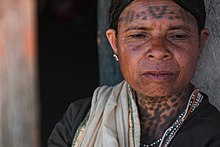Godna, also known as Khoda, is an ancient traditional form of tattoo art originating from the tribal communities of Northern and Central India.[1][2] These tattoos are characterized by intricate designs and vivid colors, often depicting elements of nature, mythology, and daily life.[3][4]

The art of Godna dates back several centuries and has its roots in the cultural practices of rural communities in India. It is traditionally practiced by women and often involves passing down techniques and designs through generations.[5][6] Tattooing is found in many primitive tribal groups like Baigas, Oraons, Birhors, Saharias, Asurs, Bhumijas, Mal Paharias, Korwas, Mundas, Santals, Konda Reddis, Khondas, Chenchus, Bharias, Kurumbas, Irulas, Bondos, Juangs, Mankidias, Sauras, Lodhas, Mudugars, Paniyans, Kattunayakans, Mannans, Muthuvans, Kanikkarans, Todas, Bhoksas, Rajis, etc.[7][8]
Gallery
editReferences
edit- ^ "Godna Painting". www.artsofindia.in. Retrieved 2024-09-26.
- ^ Hembram, Dipali (2021-03-27). "Santal Tribal Tattoos- The Wealth of afterlife. - Santals.com". Retrieved 2024-09-26.
- ^ "Godna | Art & Culture". jharkhandculture.com. Retrieved 2024-09-26.
- ^ "Godna : Tattoo Art by women of the Baiga tribe | INTACH Intangible Cultural Heritage". Retrieved 2024-09-26.
- ^ "Godna Art and the Tattooed Baiga Tribal Women of Madhya Pradesh, India". Random Scribblings. 2022-04-21. Retrieved 2024-09-26.
- ^ Bara, Pushpika Sapna (2022-10-11). "How The Godna Project Is Bringing The Indigenous Tattoo Artists To The Forefront". Adivasi Lives Matter. Retrieved 2024-09-26.
- ^ Biswas, Rachita (2021-07-15). "Godna: The ancient tribal art of Tattooing". PopBaani. Retrieved 2024-09-26.
- ^ Tribal, The Indian (2024-06-24). "Tribal Tattoo Art Godna Losing Charm". The Indian Tribal. Retrieved 2024-09-26.